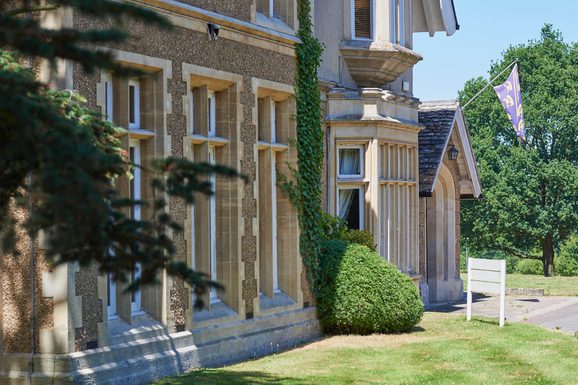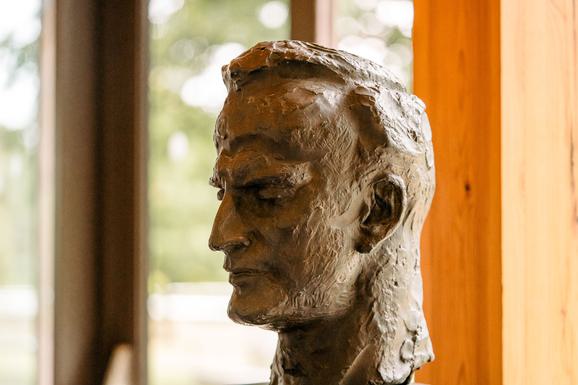The School began life in London in 1963 with just fifteen pupils before moving in the following year to Stoke d'Abernon, a small village in Surrey, south west of London. There are now over fifty staff who provide the musical, academic and pastoral direction for just under 100 boys and girls aged from 9 to 19.

The two early nineteenth-century buildings which formed the heart of the School have been extended and added to considerably over the following decades. Additional teaching, practice and boarding accommodation was added in the 1970s. The 1990s saw the creation of a new boarding house, Harris House, and the renovation of the White house to form a new academic teaching building, with a modern science laboratory, multi-purpose performance/exercise space, music technology studio, classrooms and library.
When Lord Menuhin died in 1999, his funeral was held at the School and he was buried in the school grounds just beneath the tree he planted a few years earlier to mark his 80th birthday. His legacy was commemorated further with the opening in January 2006 of The Menuhin Hall, a 300-seat concert hall just a few feet from his grave. The Hall now provides rehearsal, recording and performance space for pupils at the School, who give in the region of twenty "Showcase" concerts there each year. It is also a platform for the dozen or so "Celebrity" concerts given throughout the year by musicians of international standing, as well as being a popular venue for local groups and musical societies and the many projects we do for the wider community.
Further developments over the past few years have included the renovation, extension and covering of the outdoor pool to provide an attractive indoor swimming facility, the upgrading of the servery and dining room, and extensions to both Cowan House (for girls) and Harris House (for boys) to allow for a total of thirteen extra bedrooms for senior students, plus two staff flats. In 2016 the new Music Studios were opened, which include eleven new spacious teaching and practice rooms, and a large teaching or seminar room, all equipped with new pianos.
The international reputation of the school continues to attract pupils from all over the world who find a happy atmosphere in a large musical family. We currently have pupils from countries such as Albania, Australia, China, France, Hungary, Ireland, Italy, Japan, Kazakhstan, Lithuania, Netherlands, Poland, Russia, Singapore, South Korea, Spain, Sweden, Taiwan, Turkey, Ukraine, and USA as well as from every part of the UK.
As well as having the pianist and conductor Daniel Barenboim as our President Emeritus and Musical Patrons of the calibre and international renown of Sir András Schiff, Steven Isserlis, and Robert Levin, the School has enjoyed may visits over the years from famous musicians such as Sir Willard White, Itzhak Perlman, Gidon Kremer, Mstislav Rostropovitch, Louis Kentner, Vlado Perlemuter, and, of course, Yehudi Menuhin himself. In recent years, visiting teachers have included Sally Beamish, Kathryn Stott, Pavel Vernikov, Maxim Rysanov, Mary Bevan, Mahan Esfahani, the Sitkovetsky Trio, Castalian Quartet and Brodsky Quartet. As well as enjoying insightful masterclasses, pupils benefit from enriching opportunities to share the stage with the artists in collaborative chamber music concerts.

About Yehudi Menuhin
"His brilliance as a performer and conductor was matched by his concern for humanity and, most impressively, his work as an educator."
Yehudi Menuhin was born on 22 April 1916 in New York of Russian Jewish parents but later became a British subject. He first performed at the age of seven when he astonished a San Francisco audience with his virtuosity. His glittering career included numerous recordings and performances under some of the century's greatest conductors.
While an ambitious mother masterminded his own precocious entrance to the music world at age seven, Yehudi Menuhin took a gentler approach with young people.
In 1963, based on the idea that he had 'a few ideas that were perhaps valid', he founded the Yehudi Menuhin School, which counts among its illustrious former-pupils, violinist Nigel Kennedy.
Just as Kennedy popularised the Four Seasons in the 1980s, Yehudi Menuhin has been credited with introducing millions to classical music and for pushing the boundaries of his craft.
Although his interpretations of classical works, such as Beethoven's Violin Concerto, were received rapturously wherever performed, Menuhin was also eager to 'escape the frontiers of rigidity and prejudice' by exploring music from different cultures and styles. In the course of his career Menuhin collaborated with the great sitar star Ravi Shankar, jazz legend Stephane Grappelli and in 1932 recorded with one of Britain's greatest composers, Sir Edward Elgar.
Menuhin claimed that it was to Elgar that he owed his close affinity to England, where he later settled, becoming a British citizen in 1985. 'His music and the quality of Englishness he had, that belonging to nature and the lack of brutality was something about his music I loved and I think I owe him and his music my whole close relationship and good understanding of the English character,' he said.
But arguably his affection for England was cemented by his second marriage, to London-born ballerina Diana Gould. Strong women played a key role in Yehudi Menuhin's life: his Russian immigrant mother continued to exert an influence over his life until her death in 1996. Menuhin also credited wife Diana as a guiding force. 'They certainly work for me in a most wonderful way. Whether I attract them or whether I exploit them, it is perfectly true that they were women of great principle, of enormous capacity to endure, to suffer and of a loyalty that is unquestionable.'
The founder of countless festivals, music schools and patron of the arts, Menuhin was made a Lord by his adopted country in 1993 and was awarded the Order of Merit in 1985.
Britain was not the only country to honour Menuhin. The musician was awarded the Lorraine Cross for playing to French troops during the World War II. He also played for survivors of the Belsen concentration camp. After the war, Menuhin, whose first name translate as 'The Jew', also showed his capacity for reconciliation and forgiveness by becoming the first Jew to play with the Berlin Philharmonic. Like his hero Beethoven, who said 'old men should be explorers', Menuhin remained a committed environmentalist, human rights campaigner and yoga practitioner until the last.
But among these interests, his paramount concern was for the well-being of young people, with whom he said he had a particular affinity because he felt so youthful himself.